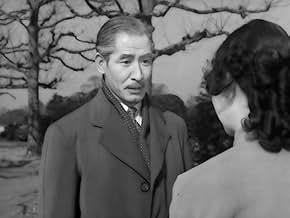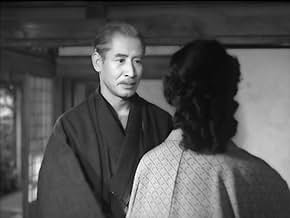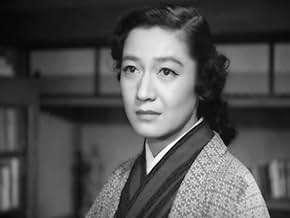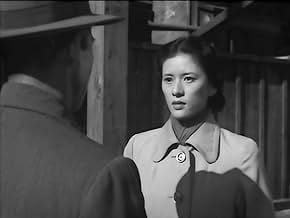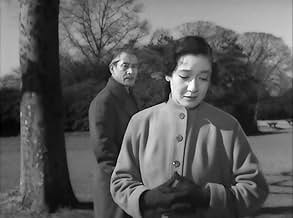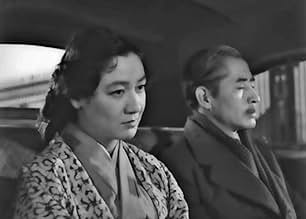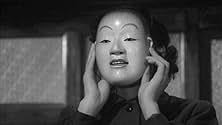अपनी भाषा में प्लॉट जोड़ेंAn ingratiating bride develops warm ties to her father-in-law while her cold husband blithely slights her for another woman.An ingratiating bride develops warm ties to her father-in-law while her cold husband blithely slights her for another woman.An ingratiating bride develops warm ties to her father-in-law while her cold husband blithely slights her for another woman.
- पुरस्कार
- 1 जीत और कुल 1 नामांकन
फ़ीचर्ड समीक्षाएं
Adapted from the novel by Yasunari Kawabata, that plays like Yasujirô Ozu movie starring Setsuko Hara as an already married wife Kikuko Ogata married to a husband Shuichi Ogata (Ken Uehara) who cheats on her at the small token while living with her husbands parents. Kikuko(Haras) interventions with other characters is a backdrop to the relationship between her and her stepfather, Shingo Ogata (Sô Yamamura). AS I had pointed out, this is what Ozu does best and that he should not be the the only director to be making these drama movies when they're others. It is subtle and self-explanatory.
One of the things altered relative to Yasunari Kawabata's novel is the elderly man's mental state, which in this adaptation isn't declining with age, with accompanying melancholy. Another is his relationship with his daughter-in-law; clearly they have a connection in the film, but it's based on simple kindness and admiration, and erotic feelings on his part aren't involved. The result is a character who is on the surface a decent old man, still married to his own wife despite his own indiscretions and having been more attracted to her older sister long ago. He's not particularly effective in reining in his son, however, and he doesn't give his own daughter enough affection or attention, reserving those things for his daughter-in-law. In that sense he's failed in life.
As in many of her films, Setsuko Hara is the brightest light in the cast. Her character is simple, kind, and filial (derisively referred to as "childlike" by her husband), but shows a toughness in the actions she takes. Hara brings out the emotions very well, and while the ending gets a little melodramatic, it has power. Overall, just a very well done, well-paced film from Mikio Naruse.
And yet I'll gladly die painfully on this hill: Every single one of his movies is terrible out of principle.
I've you've seen one Naruse, you've seen them all because there is literally nothing to it. Every single story - this one included - is basically about a ridiculously noble, self-pitying, suffering woman in a world where virtually every man is a smug, condescending parody of a man.
Women always have the moral highground and the whole thing is nothing but a mawkish didactic-play with the depth of a sunday morning cartoon.
It's redundand to say anything about his laughable radical feminism and I want my review to finally get through.
Again, his movies are objectively bad, people just don't (want to) see it because we live in objectively bad times.
I can't help but wonder if this movie was considered quite forward or daring or maybe even racy for its release date of 1954. If you're familiar with Japanese culture around this time, you know that tradition ruled and emotions and personal issues were skirted around and rarely confronted head on. The norm was to internalize everything. This movie actually does the opposite, and it does it expertly.
Well acted. Directed with perfection. Poignant dialogue. And composer Ichiro Saito nails the music score with a wonderfully romantic quality. My only critique is the editing is a bit choppy in spots, but it doesn't detract from the overall genius of the film.
क्या आपको पता है
- ट्रिवियाSô Yamamura, who portrays Shingo the father, was actually one year younger than Ken Uehara, who portrayed his son Shuichi.
- भाव
Shingo Ogata: My mind is getting very foggy these days. Even when I look at a sunflower, it reminds me of what's in my head. If only what's in my head were as grand as that sunflower. I wish there was a way to take it off and have it cleaned or repaired. That's what I was thinking on the way home.
Kikuko Ogata: [laughs] Oh, father-in-law.
Shingo Ogata: Just take off my head and take it to the hospital like taking laundry to the cleaners.
Kikuko Ogata: That's very funny.
Shingo Ogata: In other words, while the mind is getting cleaned or repaired, the body will rest in the meantime.
Kikuko Ogata: You're too much, father-in-law.
Shingo Ogata: The body will have a good rest, without even dreaming.
टॉप पसंद
विवरण
- रिलीज़ की तारीख़
- कंट्री ऑफ़ ओरिजिन
- भाषा
- इस रूप में भी जाना जाता है
- Sound of the Mountain
- उत्पादन कंपनी
- IMDbPro पर और कंपनी क्रेडिट देखें
- चलने की अवधि
- 1 घं 35 मि(95 min)
- रंग
- ध्वनि मिश्रण
- पक्ष अनुपात
- 1.37 : 1

